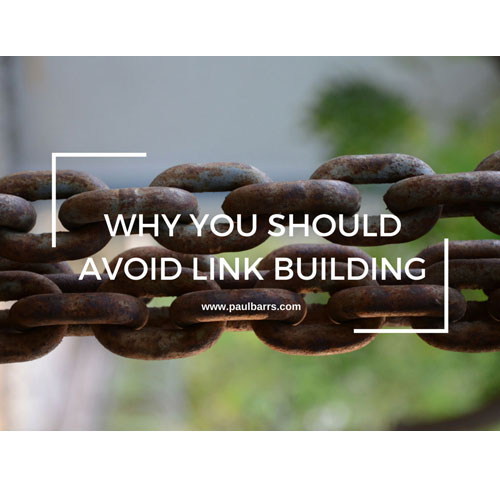
10 Mar Why You Should Avoid SEO Link Building
From the mouth of Google itself (well, one of it’s experts)… link building can do more harm than good. In today’s video we’re going to cover the sometimes messy topic of back-link building. Should we still be doing it or not? Let’s find out!
This month we’ve been talking all things search engine optimization, talking about our content, talking about the links that we build, and how we package the whole thing up.
Fitting timing that I should come across this week a comment by John Mueller, one of Google’s go-to guys. This was from a Google+ Hangout just the other week when he was asked about link building. And I’m throwing this out here for you now because so many people, when you go to them and you say, “Look, can you do some SEO work for me and get me better rankings?” One of the first things that they do is start this link building, creating backlinks process for you. And as I mentioned last time, yes, links are still an important part of the whole ranking process, but you’ve got to be so careful when doing this. It is so easy to get into trouble and do more harm than it is good with link building.
But have a listen to this, just a couple of quotes from John when asked about link building for SEO purposes. First, I should say the question was, “Is link building in any way good?” His response was, “That’s a good question. In general, I try to avoid that.” Now, that’s got to say it all, and I want you to remember that:
In general, I would try to avoid that.
He goes on, talking about content and making sure that your content stands on its own and makes it possible for other people to, of course, link to your content, which is what we’ve been talking about, to make it easy for them. Maybe put a widget on the page like this so they can share it, so they can copy the URLs, and so on. Those things make it easy for other people to share your content.
He then went on to say:
Yes, we do use links as part of our algorithm, but we also use lots and lots of other factors as well.
So, here’s the key. So only focusing on links is probably going to cause more problems for your website than it actually helps. Now, that is a direct quote from John Mueller, one of Google’s go-to guys.
Let me just summarize things for you, if I can, very, very quickly. Search engine optimization, the first thing you have to do, the most important, number one, is start with good keyword research, that keyword and key phrase research to find out what people are actually looking for when they look for your product, your type of service. That determines success or failure in everything. If you choose the right keywords, you’ve got a chance at success.
Choose the wrong ones, I don’t care how much you do anywhere else, you’ve got no chance of success whatsoever.
So keyword research is the number one most important part. When I do that for a client, I do not only keyword research but also competitive analysis to see what keywords are more competitive and more difficult than others in organic search. That’s the beginning, that’s the foundation.
Number two is the content. What you do is, is you take all of that keyword research, and you then break it down into your best opportunities and group each of those into topical sections. So for example, you might have Topic A, and there are half a dozen different keyword phrase searches that people are looking for answers on Topic A. That becomes a good, solid content conversion page.
Then you have Topic B. It’s related but not the same. Again, half a dozen, a dozen, or more different search phrases, different things that people want to know about that. That becomes a good content page for Topic B. Same again for Topic C and however many you need, usually only three or four, about half a dozen maximum. They become the core content pages of your website.
What you then do is, through your blog posts, you can take all these individual search things that people are looking for information specifically on, and you create blog posts around them; you create videos around them; you create infographics, PDFs, documents, articles, and so on. And each and every one of these things link to your primary content pages. Of course, those content pages, what’s their goal? To sell you as the expert, to build up your expertise and your authority, and build trust with the customer. That’s what Google wants to see.
So once you’ve done that, the very next thing, of course, is you create these beautiful internal link structures. That’s number three. Then, once you’ve got all of that flowing and growing and everything is moving the way you want it, then you’re going to have what John says needs to be done. People are going to share your content. People are going to create links for you. If you go out and build your own links, you run the risk, as he said, of doing more harm than good. The best way, no question, is for you to create an optimized, awesome content with opportunity for share. And keep doing it, and then people will link to you. It’s just the way it is.
I published this morning. Let’s see. I think it was my newsletter, actually. I published my newsletter based on the last blog post that I put out, and instantly, within 30 minutes of that being published, over a dozen retweets and shares and so on, within minutes of it happening. And that will continue. And for my other content, and that will continue.
I don’t just link to my homepage. I create all of my blog posts and my videos, and so on, linking to these primary content conversion pages. The content is the topic. The keyword phrase is the research. It tells you what to write about. The conversion that takes place at the end and in the middle and wherever you can says, “Hi. Contact me. I can help,” “Hi. Buy my product. This is me. Take a look. Come and see.” That’s what it’s all about. And that’s what I want you to be doing with your content and with your link building and with your SEO, your search engine optimization.
So, go to it. Have some fun. Watch this video again if you need to, and just grasp that concept of how the whole thing comes together. Okay. My name is Paul Barrs. You have a fantastic afternoon. I’ll talk to you again real soon. Bye-bye.



